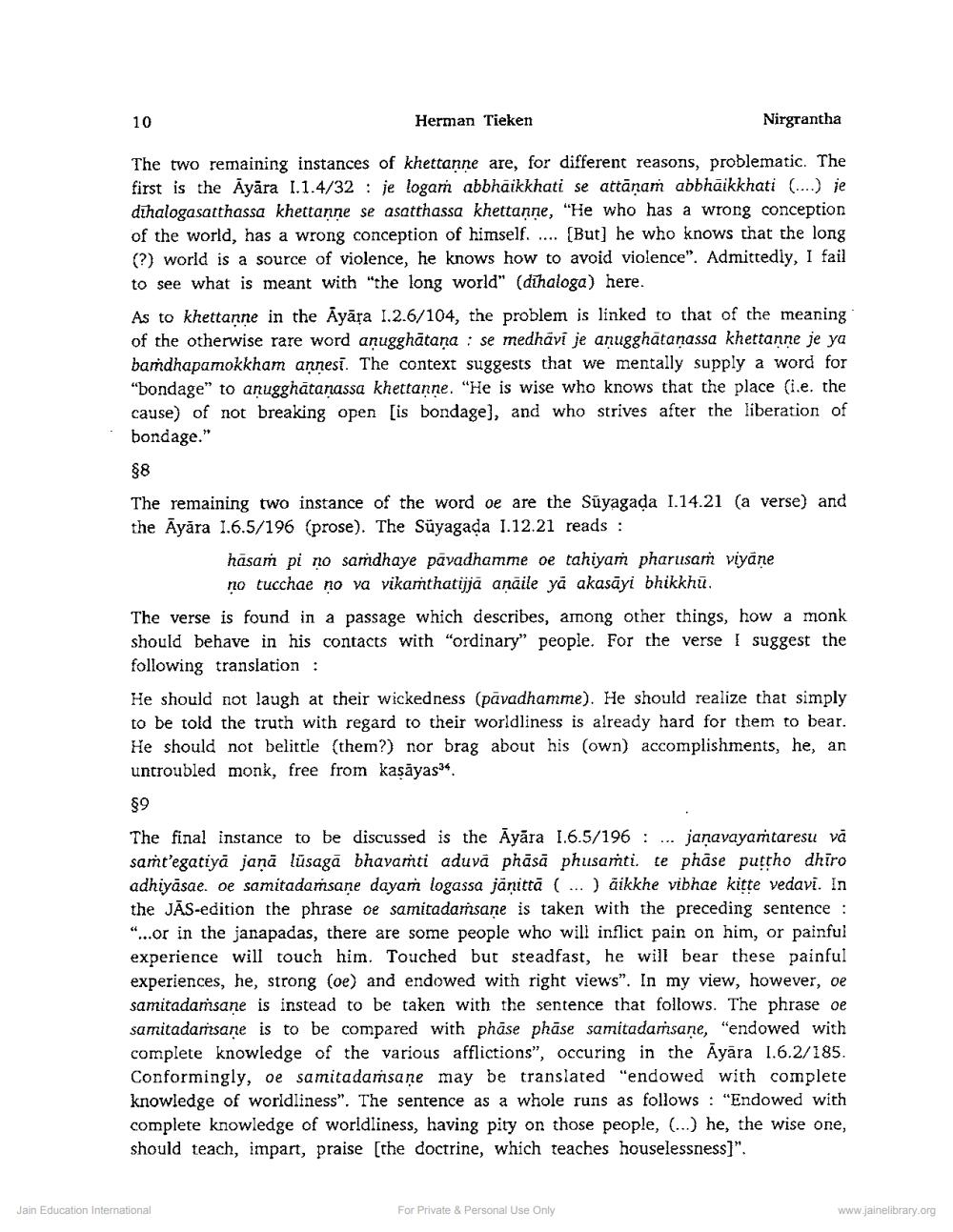________________
10
Herman Tieken
Nirgrantha
The two remaining instances of khettanne are, for different reasons, problematic. The first is the Ayāra 1.1.4/32 : je logam abbhaikkhati se attānam abbhāikkhati (...) je dihalogasatthassa khettanne se asatthassa khettanne, "He who has a wrong conception of the world, has a wrong conception of himself. .... (But] he who knows that the long (?) world is a source of violence, he knows how to avoid violence". Admittedly, I fail to see what is meant with "the long world" (dihaloga) here. As to khettarne in the Āyāra 1.2.6/104, the problem is linked to that of the meaning of the otherwise rare word anugghātana : se medhävi je anugghātanassa khettanne je ya bamdhapamokkham annesi. The context suggests that we mentally supply a word for "bondage" to anugghātanassa khettanne. "He is wise who knows that the place (i.e. the cause) of not breaking open [is bondage), and who strives after the liberation of bondage." $8 The remaining two instance of the word oe are the Süyagada 1.14.21 (a verse) and the Āyāra 1.6.5/196 (prose). The Süyagada 1.12.21 reads :
hasaṁ pi no samdhaye pavadhamme oe tahiyam pharusam viyane
no tucchae no va vikamthatijja anaile ya akasāyi bhikkhu. The verse is found in a passage which describes, among other things, how a monk should behave in his contacts with "ordinary people. For the verse I suggest the following translation: He should not laugh at their wickedness (pavadhamme). He should realize that simply to be told the truth with regard to their worldliness is already hard for them to bear. He should not belittle (them?) nor brag about his own) accomplishments, he, an untroubled monk, free from kasāyas.
89
The final instance to be discussed is the Āyāra 1.6.5/196: ... jaňavayantaresu vā saṁt'egatiyā jaņā lüsagā bhavamti aduvá phāsā phusaṁti. te phase puttho dhiro adhiyāsae. oe samitadaṁsane dayam logassa jänittā (...) äikkhe vibhae kitte vedavi. In the JĀS-edition the phrase oe samitadaṁsane is taken with the preceding sentence : "...or in the janapadas, there are some people who will inflict pain on him, or painful experience will touch him. Touched but steadfast, he will bear these painful experiences, he, strong (oe) and endowed with right views". In my view, however, oe samitadamsane is instead to be taken with the sentence that follows. The phrase oe samitadamsane is to be compared with phase phāse samitadamsane, “endowed with complete knowledge of the various afflictions", occuring in the Āyāra 1.6.2/185. Conformingly, oe samitadaṁsane may be translated "endowed with complete knowledge of worldliness". The sentence as a whole runs as follows : “Endowed with complete knowledge of worldliness, having pity on those people, (...) he, the wise one, should teach, impart, praise [the doctrine, which teaches houselessness]".
Jain Education International
For Private & Personal Use Only
www.jainelibrary.org




